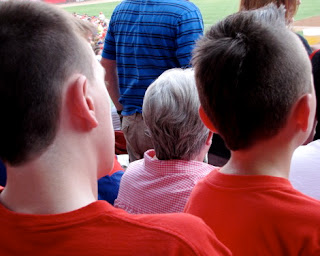 |
| Mirror? |
I'm offering Sylvia Plath's "Mirror" again because of a recent visitor comment about the poem at my June 4 post. Mr. Somewords says: "'I have looked at it so long / I think it is a part of my heart.' This line, coming from the mirror itself, is one of my favorite lines of Plath, ever. The mirror confuses a wall with its heart. I love the idea of a mirror worrying about losing its own essence because of what it has reflected for so long.”
No argument here, Mr. Somewords. To offer one’s Self as a confusion (conflation?) of mirror, heart and wall—that takes guts, and it would probably be a worthy insight coming from any of us.
I wonder if William Logan and Sharon Olds have found any walls within their hearts.
 |
| Wall. Mirror? |
 |
| Stones in water = wall or mirror? |
Adolescent narcissism and self-pity are probably two of the risks Sylvia Plath takes repeatedly, and she’s been heartily criticized for it (or was all of that criticism after death?). But I challenge those who smugly condescend toward Plath from their imagined heights as scholars or reviewers. How about we all reveal what we see in ourselves in our most honest, most naked moments. Reveal it, force-feed it to ourselves—then share it with a reading public.
 | |
| Climbing up a wall |
Might that lead to world peace? Some say toting six-guns is a way to keep the peace; some Texan even proclaimed, “An armed society is a polite society.” Well, I 'spect. Maybe.
Or could it be that all we have to do is walk naked, in every sense of the word, everywhere we go? Instead of muttering or chirping some meaningless “hey” to everyone, like Yeats’ “polite, meaningless nods” . . . we confess our most recent taboo thought or obsession.
Would that lead to less violence? Or more? Might it lead to a mass scramble for cover, both literally and figuratively?
There may be a more polite, though brutal version of all that in Conrad Hilberry’s poem, “Tongue”:
Conrad Hilberry - Tongue
(my apologies for white on black—it’s the only version I could find—why do it that way?)
And here is Conrad Hilberry reading the poem: Dr. Hilberry Reads Poem
The poem involves behavior rather than thought, but I see it as the boy’s being caught unaware, fully exposed, as if he'd confessed to three counties all his puerile dumbness—which looks remarkably similar to adult dumbness. Hilberry’s youngster is King Lear’s “man more sinned against than sinning."
Embarrassment often overrides pain when we’re caught in our most moronic, vulnerable moments, as we all are from time to time. Don’t you think? I’d love to invite examples, but for now I’m not offering any of my own.
 |
| Organic twisting |
 |
| Organic |
 |
| Organic Thrust |

















































